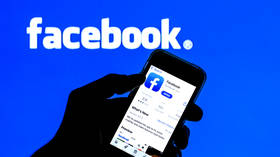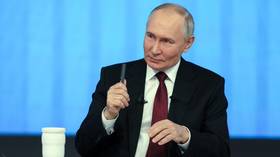Facebook blocks page of Russian diplomats taking part in security talks

The Facebook page belonging to Russia’s delegation to the security and arms control talks in Vienna was blocked for days without explanation. The diplomats have blasted it as an act of censorship specifically targeting Moscow.
The act of censorship took place last Friday, Konstantin Gavrilov, head of the continent told RT. The diplomats were so surprised by the development that they initially believed it had been some sort of technical error on the US tech giant's part. “We waited for two days” before reaching out to Facebook and to the Russian Foreign Ministry in a bid to resolve the issue, he said.
The social media service, however, did not clarify the reasons for the ban.
“There was no explanation; nothing from them,” Gavrilov said, adding that he was still wondering what exactly might have triggered the move.
The delegation posted “nothing [that could be considered] prohibited” on its account, where the content included official statements on subjects like security guarantees, the situation in Ukraine, and some other strictly “practical political issues.” It was “very strange” to find out the page had been shut down, he added.
The account was used by the Russian diplomatic delegation to the Negotiations on Military Security and Arms Control in Vienna, held under the auspices of the Organization for Security and Cooperation in Europe (OSCE). Its role was to publish official statements and press briefings by the Russian Foreign Ministry’s officials and Moscow's mission to the OSCE.
Gavrilov believes it was all part of a targeted anti-Russian campaign waged by western social media giants. These companies have a “policy” of erasing any content that “does not correspond to their views” and they “can do anything they want,” the diplomat said, admitting that his own personal Facebook page had been blocked three times.
“They all follow our accounts very closely and when they think it is too much, they block them without explanation,” Gavrilov said. “This is ridiculous. No proof, nothing. It is an unprecedented policy of the western media against us,” he said, adding that, according to his estimations, Russian officials are targeted much more often than any of their foreign counterparts.
Eventually, the diplomats were forced to request assistance from the Russian media watchdog Roskomnadzor. The agency issued a statement on Sunday, accusing Facebook of an “act of censorship” and warning it that such actions are forbidden under Russia’s constitution. It also demanded the account be restored “immediately” and urged Facebook to provide an explanation for its removal.
The US social media giant has not yet made any public statements about the incident. The delegation’s page was restored on Monday.
Facebook has been repeatedly fined in Russia over non-compliance with national legislation. The list of violations range from breaching privacy laws by storing the personal data of Russians outside of the country's territory to repeatedly failing to delete content banned in Russia.
Facebook also cracked down on media outlets it has deemed linked to Russia, such as the RT-affiliated Redfish. The ban of the service's account drew criticism from the International Federation of Journalists.
Gavrilov believes that the enormous power wielded by social media companies should be counterbalanced. “It is necessary to do something to regulate this,” the diplomat said, adding that the Russian government is currently “working hard” on drafting legislation that would create a legal framework for their operation on Russian territory.













